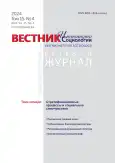Protest Consciousness and Protest Culture of the Young People of the Russian Far East
- Authors: Marin E.B.1,2
-
Affiliations:
- MSU named after admiral G.I. Nevelskoy
- Far Eastern Federal University
- Issue: Vol 15, No 4 (2024)
- Pages: 255-281
- Section: Risks of social metamorphosis
- URL: https://journal-vniispk.ru/2221-1616/article/view/278558
- DOI: https://doi.org/10.19181/vis.2024.15.4.13
- EDN: https://elibrary.ru/HBHQYA
- ID: 278558
Cite item
Full Text
Abstract
The study is based on youth surveys conducted in 2020 and 2024 in the Far East. Two types of protestants were identified in the sample: supporters of peaceful and radical protest. They are carriers of two different types of protest consciousness, including values, ideas, and motives for protest.
The author concludes that the youth of the Far East has two types of protest consciousness and protest culture: a peaceful type of protest consciousness and, based on it, peaceful civil protest ("petition culture"); and a radical protest consciousness and, based on it, radical protest ("rebellion culture"). "Petition culture" is associated with an active civic position, interest in politics, participation in legal forms of political and public activities. Its bearers are characterised by such values as justice and equality, freedom and creativity, human rights and the desire for renewal. The culture of radical protest is determined by the subject type of political consciousness, strong negative emotions, strong ethnicity and belief in a threat to one's nationality. It can be noted that the bearers of radical protest consciousness are ambivalent in relation to the forms of protest: they are ready for both peaceful and radical forms. We interpret this as follows: if a subject is ready for more radical forms of protest, then he or she will also accept less radical ones. But bearers of peaceful protest consciousness are ready only to participate in peaceful protest (that's why they are "peaceful"). Radical forms frighten them and are unacceptable to them.
According to the results of our study, the "petition culture" is more common in the sample, which means that a dialogue between the authorities and the youth is possible. The work also examines the generational characteristics of the protest consciousness of generations “Y” (or millennials) and “Z” (or centennials).
About the authors
Egor B. Marin
MSU named after admiral G.I. Nevelskoy;Far Eastern Federal University
Email: egor-marin@yandex.ru
ORCID iD: 0000-0002-0409-5065
SPIN-code: 4047-7133
Candidate of Sociological Sciences, Associate Professor, Department of history, political science and state and legal disciplines, The Maritime state University named after Admiral G. I. Nevelskoy; Associate Professor, Department of Psychology and education, Far Eastern Federal University, Vladivostok, Russia Vladivostok, Russia
References
- Артюхина В. А. Осмысление социального протеста в современной социологии: анализ основных подходов // Социологические исследования. 2017. № 11. С. 30–34. doi: 10.7868/S0132162517110046; EDN: ZRQQNH.
- Ахременко А. С., Стукал Д. К., Петров А. П. Сеть или текст? Факторы распространения протеста в социальных медиа: теория и анализ данных // ПОЛИС. Политические исследования. 2020. Т. 29. № 2. С. 73–91. doi: 10.17976/jpps/2020.02.06; EDN: APZWMB.
- Баранова Г. В. Методика анализа протестной активности населения России // Социологические исследования. 2012. № 10. С. 143–152. EDN: PFLLRF.
- Волков Д. А. Протестные митинги в России конца 2011 – начала 2012 гг.: запрос на модернизацию политических институтов // Вестник общественного мнения. Данные. Анализ. Дискуссии. 2012. № 2(112). С. 73–86.
- Габа О. И. Молодежь как субъект протестных настроений // Знание, понимание, умение. 2015. № 1. С. 144–151. EDN: ULLCGT.
- Керимов А. А., Эбзеев А. А. Факторы и тенденции протестной активности молодежи в современной России // Дискурс-Пи. 2022. Т. 19. № 1. С. 104–123. doi: 10.17506/18179568_2022_19_1_104; EDN: GSFTBH.
- Леньков Р. В., Колосова О. А., Ковалева С. В. Социально-психологическая диагностика и прогнозирование протестного поведения молодежи в цифровой среде // Цифровая социология. 2021. Т. 4. № 1. С. 31–41. doi: 10.26425/2658-347X-2021-4-1-31-41; EDN: YQQGVH.
- Марин Е. Б. Структура протестного мышления и представление о социальном протесте молодежи поколений «Y» и «Z» Дальнего Востока и Москвы // Вестник Института социологии. 2022. Т. 13. № 1. C. 86–107. doi: 10.19181/vis.2022.13.1.776; EDN: WEZDKL.
- Марин Е. Б. Молодежные протестные настроения в Приморском крае (на примере студенчества) // Вестник Института социологии. 2018. Т. 9. № 3. C. 63–82. doi: 10.19181/vis.2018.26.3.524; EDN: YWAGXB.
- Парма Р. В., Давыдова М. А. Триггеры политической мобилизации массовых протестов в социальных медиа Российской Федерации и Республики Беларусь в 2020–2021 гг. // Власть. 2022. № 3. С. 97–105. doi: 10.31171/vlast.v30i3.9045; EDN: UJJWYG.
- Радаев В. В. Миллениалы на фоне предшествующих поколений: эмпирический анализ // Социологические исследования. 2018. № 3. С. 15–33. doi: 10.7868/S0132162518030029; EDN: YVQXQU.
- Серкин В. П. О возможностях метода семантических универсалий Е. Ю. Артемьевой // Вестник МГУ. Сер. 14. Психология. 2000. № 2. С. 74–79.
- Ядов В. А., Климова С. Г. и др. Социальная база поддержки реформ и потенциал массового протеста // Россия в глобальных процессах: поиски перспективы / Отв. ред. М. К. Горшков. М.: ИС РАН, 2008. С. 85–101. EDN: TZCRHT.
- Almond G. A., Verba S. The Civic Cilture: Political Attitudes and Democracy in Five Nations. SAGE, 1989. 379 p.
- Davis J. A formal interpretation of the theory of relative deprivation // Sociometry. 1959. Vol. 22. No. 4. P. 280–296.
- van Stekelenburg J., Klandermans B. The social psychology of protest // Current Sociology. 2013. Vol. 61. No. 5–6. P. 886–905. doi: 10.1177/0011392113479314.
- van Zomeren M., Postmes T., Spears R. Toward an integrative social identity model of collective action: A quantitative research synthesis of three socio-psychological perspectives // Psychological Bulletin. 2008. No. 134. P. 504–535. doi: 10.1037/0033-2909.134.4.504.
- Vitak J., Zube P. et al. It’s complicated: Facebook users’ political participation in the 2008 election // Cyberpsychology, Behavior, and Social Networking, 2011. No. 14(3). P. 107. doi: 10.1089/cyber.2009.0226.
- Schwartz S. H. Are there universal aspects in the content and structure of values? // Journal of Social Issues. 1994. Vol. 50. P. 19–45.
Supplementary files










